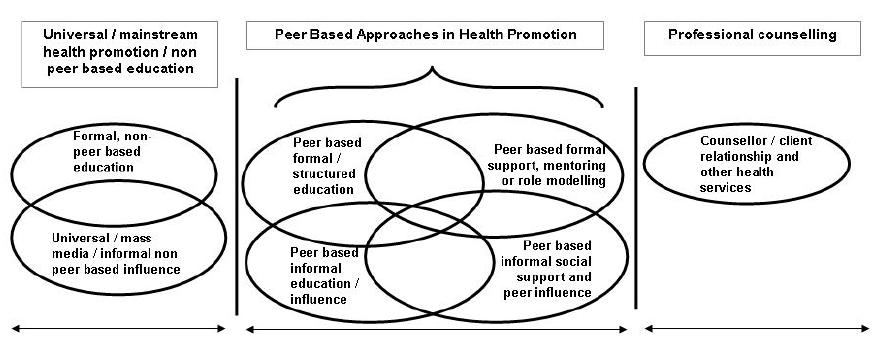Mental health framework
A framework for positioning peer-based approaches in mental health promotion
A framework for positioning peer-based approaches in mental health promotion was developed by Brown and colleagues1 in the context of a broader research project aimed at developing good practice guidelines for designing and implementing peer-based programs (Figure 1).
Inconsistent and overlapping terminology and associated incorrect assumptions and expectations in the field of peer-based mental health promotion has been found to impede the process of evaluating and comparing programs, which jeopardises the sustainability of existing programs and funding of new programs. Consequently, the framework was developed to provide a general understanding of what peer-based programs are and what they aim to accomplish.1
The model describes different types of peer-based programs in mental health promotion positioning them between universal and mainstream health promotion and professional counselling. Universal approaches in health promotion are described as all types of formal and informal activities, involving all population groups and applying various health promotion strategies, not exclusively relying on peer-based strategies; whereas professional counselling can be seen as an early treatment stage involving therapeutic services and professional staff. Within this spectrum the wide array of peer-facilitated actions are captured: ‘structured educational programmes, support, mentoring and advocacy, informal education, social support and influence’.1
Methods applied within a program may vary considerably. Brown and colleagues distinguish between programs that have a mainly educational aspect using formal and/or informal methods (left hand side of peer-based approaches in health promotion), in contrast to programs providing formal mentoring or informal social support (right hand side). To indicate that a program does not necessarily focus on one single aspect, and the boundaries are not always clearly defined, the different types of programs overlap with each other.1
Figure 1 A Framework for positioning peer-based approaches in mental health promotion

Source: Brown et al., p.301
 References
References
- Brown, G, Lobo, R, Maycock, B & Burns, S 2007a, ‘A framework for defining the role peer-based approaches in mental health promotion’, International Journal of Mental Health Promotion, vol. 9, no. 3, pp. 29-37.